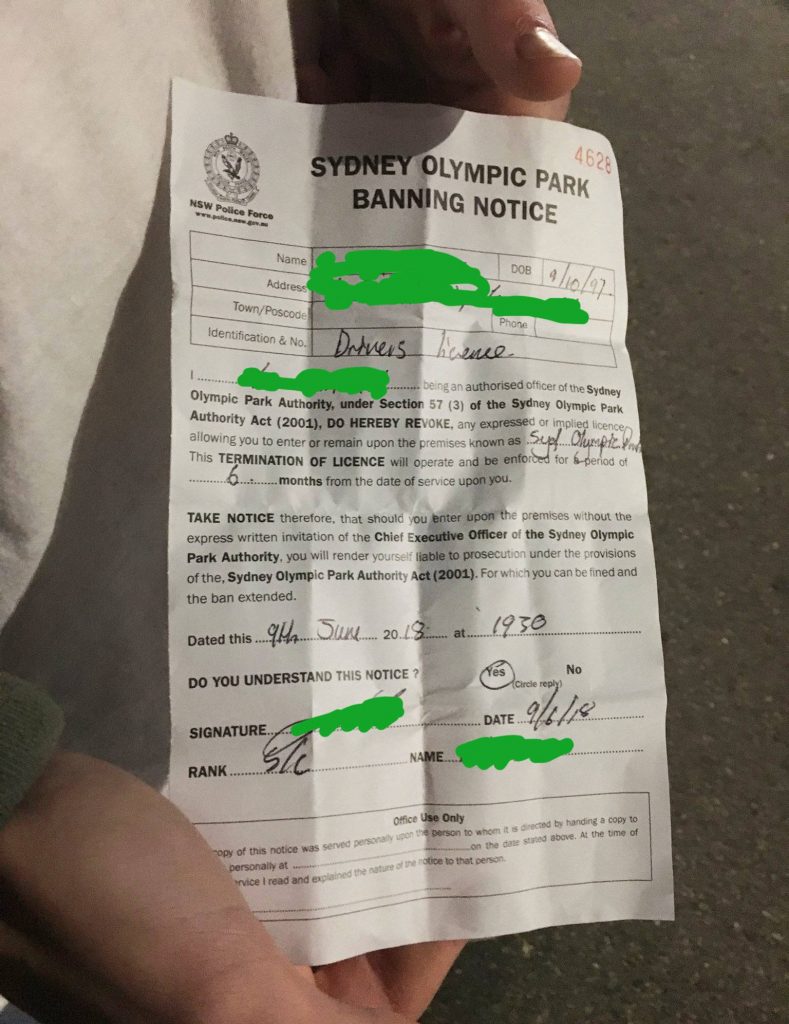“This Is A Serious Abuse Of Powers”: The Greens Will Take NSW Police To Court Over Drug Dogs
Some punters were handed six-month bans from the venue, despite not having any drugs on them.

The Greens’ anti-sniffer dog initiative Sniff Off will meet with legal representatives this week to decide on a course of action against the NSW Police Force, after a number of punters were refused entry to Above & Beyond’s Sydney gig on the weekend due to new and controversial drug dog rules.
Last week, NSW Police announced they would deny entry to any gig-goer who sniffer dogs “indicated” was carrying drugs — regardless of whether police actually found any drugs on them.
The announcement caused an uproar among civil liberties advocates, and on Friday The Greens’ Sniff Off sought an injunction in the NSW Supreme Court in an effort to stop the police carrying out the new practice.
But the injunction application was dismissed by judge Michael Pembroke, who remarked that the court “doesn’t waste time with hypothetical issues like that”. Essentially, until someone’s rights had actually been infringed, no action could be taken.
NSW Police went ahead with their new policy at Saturday’s gig, and Sniff Off campaigner and Greens MP David Shoebridge has now told Junkee they know of “at least five” ticket holders who were refused entry by police after a sniffer dog had falsely indicated they were carrying drugs.
“On at least one occasion, the ticket holder wasn’t just excluded, they were given a six-month ban from entering any part of the Sydney Olympic Park precinct,” Shoebridge told Junkee. “It’s an extraordinary double punishment, all based on the opinion of a dog.”

A Sydney Olympic Park banning notice from the weekend. Photo via Sniff Off Facebook
In one case, as reported by the Sydney Morning Herald, a 23-year-old woman was denied entry because the drug dog picked up that she was carrying Vicks nasal decongestant.
“I was just about to go through the bag check and then the dog came up around and they pulled me aside and asked me come over to the check-in station,” she told the SMH. “They told me to take my top off and then asked me all these questions like, ‘Have you been around it [drugs]? When was the last time you took it?'”
“I spoke to the licensee who said, ‘You’ve got the Vicks stick and the dog has identified you as positive so we’re not letting you in.'”
“This is a serious abuse of police powers and has caused substantial distress to those who were unfairly excluded,” Shoebridge says. “As well as the more than $100 for the ticket, many attendees have also paid for flights and accommodation, meaning the denial of entry has put them substantially out of pocket. The dogs get it wrong more often than not, and that’s a problem the police should be dealing with, instead they’re just doubling down.”
On average, sniffer dogs get it wrong around 80 percent of the time. The Greens and Sniff Off will meet with various legal representatives this Wednesday to decide on a course of action. That might mean seeking an injunction to stop the policy from being enacted again, or arranging a class action for those that were excluded from the Saturday’s gig.
“We will be exploring what the best legal avenue is,” Shoebridge said. “Whether that’s a further injunction, a class action, or a series of individual claims based on either civil damages or intentional torts. We want to ensure the strongest case is presented, and that may take some time.”
Will Tregoning, director and founder of harm reduction advocacy organisation Unharm, told Junkee that there’s a good chance the new drug dog practice will be continued — and extended.
“We won’t just see this practice continue. We will also see further extensions of police powers in these operations,” Tregoning told Junkee. “That has been the consistent pattern since 2001, when Dog Unit first started surveillance operations on people in public place.
“[Since then] people at these events have changed their behaviours in ways that increased risk — taking all their drugs before travelling to the event, or at the entrance, or hiding drugs in body cavities. Again, instead of winding back the program, police added strip searches to the operations. Just like regular searches during drug detection operations, most strip searches find no drugs. The searches are grossly invasive, and probably illegal.
“The extension of police powers will continue — and will continue to undermine relations between police and this community — right up until the whole program collapses under the weight of grotesque overreach, invasion of privacy, and lack of accountability for failure.”
Shoebridge warns that if the police feel empowered after enforcing this practice at one music event, there’s nothing to stop them from extending it state-wide.
“This is a fundamental civil liberty issue,” he says. “And that’s why we’re not going to let it go.”




